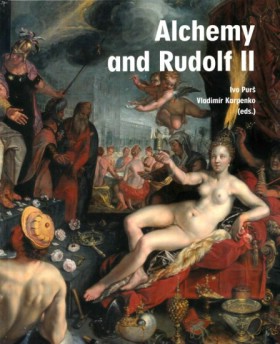Alchemy and Rudolf II
Ivo Purš, Vladimír Karpenko
Alchemy and Rudolf II.
Exploring the Secrets of Nature in Central Europe in the 16th and 17th centuries
It is difficult to think of a theme in Bohemian and Central European history in the early modern age that is so popular and at the same time still today so little understood as that of the alchemy that is associated with the reign of the Emperor Rudolf II (1552–1612). The blame for this can by no means be laid solely at the door of the well known film from the early 1950s, for it only took over the oversimplified picture of “Rudolfine alchemy” as it was developed in Czech and German historiography in the 19th century and the first half of the 20th. This picture mixed legends with facts that could be historically documented, and which were consequently frequently interpreted incorrectly. It was not until the 1970s that the situation started to change, when a renewed interest in Mannerism and Rudolfine art led historians to examine other areas of Rudolfine culture, and therefore alchemy, too, which was a significant part of that culture. This interest was naturally accompanied by historians looking at alchemy itself in a different way, no longer seeing it simply as a predecessor of modern chemistry – and thus as a subject reserved for the specialised history of science – and starting to study it as a complex and significant cultural-historical and social phenomenon connected with other disciplines, technologies, and areas of the life of society, including not only medicine, mining and metallurgy, but also religion, visual art, and the representation of the nobility.
This publication deals both with activities that were directly supported by the Emperor Rudolf II, and also those that developer in the broader social circle connected with the imperial court. This extended beyond the Czech lands to take in Austria and many parts of the Holy Roman Empire. The theme under consideration is primarily delimited by the period of the reign of Rudolf II, from 1576 to 1612, but for a proper understanding of the context it is also essential to refer to the development of alchemical research in Central Europe roughly from the beginning of the 16th century, and it is likewise important to follow its repercussions in the 17th century.
Artefactum, Prague 2016, 215 x 270 mm, 869 pages, ISBN 978–80–86890–85–2
Alchemy and Rudolf II.
Exploring the Secrets of Nature in Central Europe in the 16th and 17th centuries
It is difficult to think of a theme in Bohemian and Central European history in the early modern age that is so popular and at the same time still today so little understood as that of the alchemy that is associated with the reign of the Emperor Rudolf II (1552–1612). The blame for this can by no means be laid solely at the door of the well known film from the early 1950s, for it only took over the oversimplified picture of “Rudolfine alchemy” as it was developed in Czech and German historiography in the 19th century and the first half of the 20th. This picture mixed legends with facts that could be historically documented, and which were consequently frequently interpreted incorrectly. It was not until the 1970s that the situation started to change, when a renewed interest in Mannerism and Rudolfine art led historians to examine other areas of Rudolfine culture, and therefore alchemy, too, which was a significant part of that culture. This interest was naturally accompanied by historians looking at alchemy itself in a different way, no longer seeing it simply as a predecessor of modern chemistry – and thus as a subject reserved for the specialised history of science – and starting to study it as a complex and significant cultural-historical and social phenomenon connected with other disciplines, technologies, and areas of the life of society, including not only medicine, mining and metallurgy, but also religion, visual art, and the representation of the nobility.
This publication deals both with activities that were directly supported by the Emperor Rudolf II, and also those that developer in the broader social circle connected with the imperial court. This extended beyond the Czech lands to take in Austria and many parts of the Holy Roman Empire. The theme under consideration is primarily delimited by the period of the reign of Rudolf II, from 1576 to 1612, but for a proper understanding of the context it is also essential to refer to the development of alchemical research in Central Europe roughly from the beginning of the 16th century, and it is likewise important to follow its repercussions in the 17th century.
Artefactum, Prague 2016, 215 x 270 mm, 869 pages, ISBN 978–80–86890–85–2

